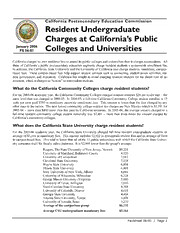
ERIC ED493556: Resident Undergraduate Charges at California's Public Colleges and Universities. Factsheet 06-01 PDF
Preview ERIC ED493556: Resident Undergraduate Charges at California's Public Colleges and Universities. Factsheet 06-01
California Postsecondary Education Commission Resident Undergraduate Charges at California’s Public January 2006 Colleges and Universities FS 06-01 California charges its own residents less to attend its public colleges and universities than it charges nonresidents. All three of California’s public postsecondary education segments charge resident students a systemwide enrollment fee. In addition, the California State University and the University of California also charge students mandatory, campus- based fees. These campus-based fees help support student services such as counseling, student union activities, stu- dent government, and recreation. California has sought to avoid charging resident students for the direct cost of in- struction, which it charges as “tuition” to nonresident students. What do the California Community Colleges charge resident students? For the 2005-06 academic year, the California Community Colleges charged resident students $26 per credit unit – the same level that was charged in 2004-05. In 2004-05, a full-time California Community College student enrolled in 15 units per term paid $780 in mandatory statewide enrollment fees. This amount is lower than the fees charged by any other state in the nation. The next lowest community college resident fee charges are New Mexico which is $1,191 for 2005-06 -- more than $400 more than that paid by California residents. In 2005-06, the average amount charged to a full-time resident community college student nationally was $2,481 – more than three times the amount charged by California’s community colleges. What does the California State University charge resident students? For the 2005-06 academic year, the California State University charged full-time resident undergraduate students an average of $3,164 in mandatory fees. This amount includes $2,922 in systemwide student fees and an average of $644 in campus-based fees. This total is lower than all of the 15 public universities with which the California State Univer- sity compares itself for faculty salary purposes. It is $2,968 lower than the group’s average: Rutgers, The State University of New Jersey, Newark $9,221 University of Maryland, Baltimore County 8,520 University of Connecticut 7,912 Cleveland State University 7,158 Wayne State University 6,898 Illinois State University 6,801 State University of New York, Albany 6,604 University of Wisconsin, Milwaukee 6,224 George Mason University (Virginia) 5,880 University of Texas, Arlington 5,693 North Carolina State University 4,318 University of Colorado, Denver 4,611 Georgia State University 4,464 Arizona State University, Tempe 4,408 University of Nevada, Reno 3,270 Average of the comparison group $6,132 Average CSU undergraduate mandatory fees $3,164 Factsheet 06-01 / Page 1 California Postsecondary Education Commission What does the University of California charge resident students? For 2005-06, the University of California charged full-time undergraduate residents an average of $6,802 in mandatory charges. This includes systemwide student fees of $5,684 and campus-based fees which average $628. These manda- tory fees do not include the cost of health insurance. If students do not have health insurance, they are required to pay for such coverage. The cost of student health insurance is determined by each University of California campus. The $6,802 in mandatory fees for resident undergraduate students is lower than three of the four public universities with which the University of California compares itself for faculty salaries. It is $1,019 lower than the average of that group: University of Michigan, Ann Arbor $9,213 University of Illinois, Urbana-Champaign 8,634 University of Virginia 7,370 State University of New York, Buffalo 6,068 Average of the comparison group $7,821 Average UC undergraduate mandatory fees (excluding health insurance) $6,802 What has the Governor proposed in terms of changes to resident undergradu- ate student fees for the 2006-07 fiscal year? The Governor’s proposed 2006-07 budget proposes to “buy out” scheduled fee increases based on the state’s improved revenue forecast. The Governor’s budget includes additional funding of $75 million for the University of California and $54.4 million for the California State University that will allow student fees in 2006-07 to remain at the current 2006-06 levels. The Governor’s budget also recommended no increase in fees for students attending California Community Colleges. As noted above, it continues the current $26 credit unit charge, which translates into $780 annually for a full-time Cali- fornia Community College student. This decision to buy out fee increases means that the California State University will be lower than all 15 State Univer- sity public faculty salary comparison institutions, and about half the average amount charged by their comparators. With no fee increases anticipated for full-time resident undergraduates at the University of California, the average an- nual charge will remain about 8% lower than the average amount charged by the University of California’s public fac- ulty salary comparison institutions. Who are resident students? The California Community Colleges and the California State University determine the residency of their students ac- cording to State law, which defines resident students for tuition purposes as those who (1) have lived in California for at least one year and one day prior to enrolling in a college or university, and (2) intend to make California their home. A student may demonstrate an intent to reside in California through a number of means, including obtaining a Califor- nia driver’s license, owning or renting property in the state, registering a vehicle in California, and paying California personal income taxes. State law allows nonresident students who have attended a California high school for three years and graduated to be considered as residents for tuition purposes. Generally, undergraduate students at the University of California are considered nonresidents if their parents reside out-of-state. They may be classified as California residents if they can demonstrate that they are financially independ- ent of their parents for at least two years prior to being classified as a resident. As such, it usually takes about three years for eligible out-of-state undergraduate students to qualify as California residents for tuition purposes. Page 2 / Factsheet 06-01
